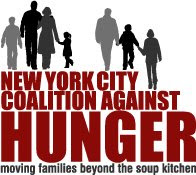Tuesday, September 26, 2006
Council vows to increase food stamp enrollment
Monday, September 25, 2006
Bloomberg Ignores Food Stamp Eligibility of Children, Seniors, and the Disabled
Forbes' Billionaires Nearly Double in New York City
Tuesday, September 19, 2006
Tax Credits for the Poor
Friday, September 15, 2006
Nassau and Bronx Emergency Shelters lose funding
Turnover in Emergency Shelter Grants; Nassau, Bronx Lose Funding
This year’s award of Emergency Shelter Grants (ESG) by the State’s Office of Temporary and Disability Assistance (OTDA) has seen considerable turnover among grantees and a complete loss of funding for several high need counties. Nassau County’s only two prior recipients of ESG funding – the Interfaith Nutrition Network (The INN) and the Nassau County Coalition Against Domestic Violence (NCCADV)– both lost out in this year's grant awards leaving the County with no ESG grantees. The Bronx also will go without a single ESG award this year. Citizen’s Advice Bureau had been the borough’s only ESG- funded provider in the prior round of awards.
The turnover was the result of an increase number of proposals for the FY2006 program, explained John Sheedy of OTDA’s Public Information Office. Funds were not allocated based on geography, he explained, “the determination of grant awards was based solely on how the organizations ranked.” Statewide, the ESG funding remained virtually constant from year to year at almost $3.1 million. A total of 33 awards were made this year versus 35 last year.
“NCCADV had received grants for the past eight years and we have received grants for the past 11 years,” said Jean Kelly, Executive Director of The INN. The INN had used its $100,000 ESG funding to support work at its three shelters in the county. While the ESG grant represents only a small portion of the agency’s overall budget for shelters, the loss is crucial in light of fundraising pressures, explained Kelly. “We are already operating at a loss. At this time, we are having to consider closing one of our shelters. It would be about 8 families and 35-40 people not having a place to go.”
New York City’s allocation fell by 17% from $833,338 in 2005 to $733,212 in 2006.
A full list of local ESG awardees for 20 06 is attached.
06 is attached.
Wednesday, September 13, 2006
Child Obesity
Free, Fresh Fruit
Link found between Poverty and Asthma
Thursday, September 07, 2006
Anti-poverty Legislation announced
Funding despite fiscal shortage
Wednesday, September 06, 2006
Hunger among NYC children
Poverty and obesity linked in NYC children
Tuesday, September 05, 2006
Simplified access to benefits
New policies to help the poor people of
